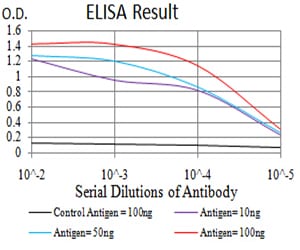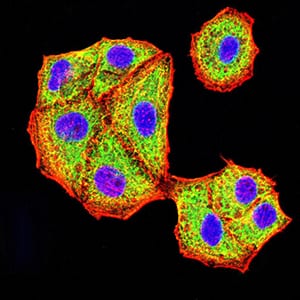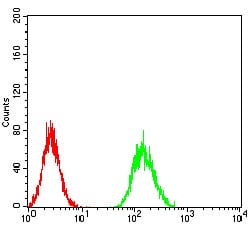


| WB | 咨询技术 | Human,Mouse,Rat |
| IF | 咨询技术 | Human,Mouse,Rat |
| IHC | 咨询技术 | Human,Mouse,Rat |
| ICC | 1/50 - 1/250 | Human,Mouse,Rat |
| FCM | 1/200 - 1/400 | Human,Mouse,Rat |
| Elisa | 1/10000 | Human,Mouse,Rat |
| Aliases | CDHN; NCAD; CD325; CDw325 |
| Entrez GeneID | 10000 |
| clone | 5H7C3 |
| WB Predicted band size | 55.8kDa |
| Host/Isotype | Mouse IgG2a |
| Antibody Type | Primary antibody |
| Storage | Store at 4°C short term. Aliquot and store at -20°C long term. Avoid freeze/thaw cycles. |
| Species Reactivity | Human |
| Immunogen | Purified recombinant fragment of human AKT3 (AA: 37-150) expressed in E. Coli. |
| Formulation | Purified antibody in PBS with 0.05% sodium azide |
+ +
以下是3篇与AKT3抗体相关的文献及其摘要概览:
---
1. **"AKT3-mediated resistance to apoptosis in glioblastoma"**
*作者:Chen et al., 2018*
**摘要**:本研究通过Western blot和免疫组化分析,发现胶质母细胞瘤中AKT3蛋白水平显著升高,且与肿瘤细胞抗凋亡能力相关。使用AKT3特异性抗体证实其通过抑制Bax活化促进肿瘤生存。
---
2. **"AKT3 gene deletion and protein expression in neurological disorders"**
*作者:Smith et al., 2015*
**摘要**:利用AKT3抗体对脑组织样本进行免疫荧光染色,发现AKT3在神经元发育中高表达,其缺失与皮层畸形相关,提示AKT3在神经发育疾病中的潜在作用。
---
3. **"Targeting AKT3 signaling in triple-negative breast cancer"**
*作者:Wang et al., 2020*
**摘要**:通过shRNA敲低AKT3并结合特异性抗体检测,发现抑制AKT3可阻断mTOR通路并增强化疗敏感性,为三阴性乳腺癌治疗提供新靶点。
---
这些文献均使用AKT3抗体进行蛋白表达或功能研究,覆盖癌症、神经疾病等领域,可作为相关实验设计的参考。如需具体DOI或期刊信息,可进一步补充。
The AKT3 antibody is a crucial tool in studying the AKT3 protein, a serine/threonine kinase belonging to the AKT (protein kinase B) family, which includes AKT1 and AKT2. AKT3 plays a pivotal role in the PI3K/AKT/mTOR signaling pathway, regulating critical cellular processes such as cell survival, proliferation, metabolism, and apoptosis. Structurally, AKT3 contains an N-terminal pleckstrin homology (PH) domain, a central kinase domain, and a C-terminal regulatory domain. Its activation depends on phosphorylation triggered by growth factors or other stimuli, often via PI3K-mediated PIP3 generation.
AKT3 is particularly notable for its tissue-specific expression, with high levels observed in the brain, heart, and kidneys. Dysregulation of AKT3 has been linked to multiple pathologies, including cancer (e.g., glioblastoma, melanoma) and neurological disorders (e.g., autism spectrum disorders, megalencephaly). In cancer, AKT3 overexpression or mutations may drive tumor progression, metastasis, and therapy resistance. In neurodevelopmental contexts, AKT3 mutations are associated with abnormal brain growth and cortical malformations.
AKT3 antibodies are widely used in research to detect protein expression, phosphorylation status, and subcellular localization via techniques like Western blotting, immunohistochemistry, and immunofluorescence. They also aid in elucidating AKT3's interactions with downstream targets (e.g., GSK-3β, FOXO) and upstream regulators. These antibodies are essential for exploring AKT3's therapeutic potential, particularly in designing targeted inhibitors for precision medicine.
×